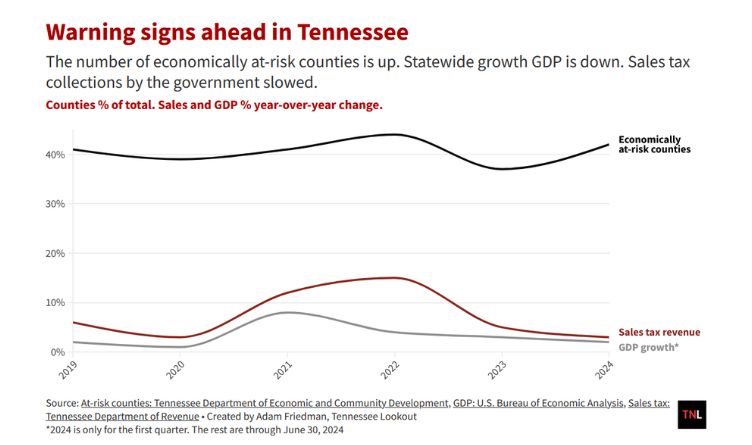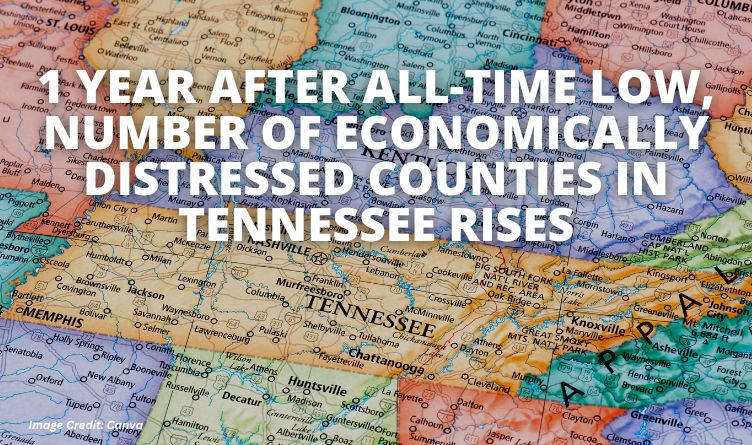Image Credit: Canva
By Adam Friedman [The Tennessee Lookout -CC BY-NC-ND 4.0] –
After nearly half a decade of positive results, several indicators suggest Tennessee’s economy is slowing — not into recession territory, but showing weaker performance than in the past.
The number of economically distressed and at-risk counties in Tennessee increased from 35 in June 2023 to 40 this year, according to information released by the state’s Department of Economic and Community Development.

Last year’s number represented an all-time low and was celebrated by state officials, especially as it has declined almost every year under Gov. Bill Lee. This year’s increase, however, did not receive the same fanfare.
There was no news release about the change. Elizabeth Johnson, a Lee spokesperson, focused on positives of the governor’s time in office when asked about the administrations thoughts on the increase, adding “what happens in rural Tennessee matters to all of Tennessee, and as our state experiences unprecedented economic growth and job creation, we’ll continue our work to prioritize rural communities so that Tennesseans in every county can thrive.”

The Appalachian Regional Commission compiles the distressed county reports, which indicate whether a county suffers from higher poverty or unemployment rates than the rest of the southeastern United States.
Almost all of Tennessee’s worst-performing counties are in rural areas, concentrated in the southwestern and northeastern parts of the state.
The state has 31 counties classified as at-risk, meaning they aren’t in the bottom 10% of the more than 3,000 counties reviewed by the commission but close. Nine counties — Bledsoe, Cocke, Grundy, Hancock, Hardeman, Haywood, Lake, Perry, and Scott — are classified as economically distressed.
Since 2017, Tennessee’s number of distressed and at-risk counties has fallen from a high of 62, but this year’s uptick coincides with a report that the state’s GDP growth slowed significantly at the start of the year.

Tennessee’s economy grew at a 2.8% pace in 2023, but through the first three months of this year, that rate fell to 1.7%, according to the U.S. Bureau of Economic Analysis. The state is not alone in this slowdown and still outpaces the U.S. average.
Another indicator of the state’s economy is sales tax collections, which track changes in spending and prices. For several years following the onset of the coronavirus pandemic, Tennessee experienced double-digit growth in sales tax collections as the state economy heated up.
But more recently those collections are fallen down, and much of the gains have been caused by inflation, where last year Tennessee ranked second among all states.




2 Responses
AND you can blame BIDEN and HARRIS for most of this, and yet HARRIS is ahead in the polls. THIS country keeps voting in the same DEMOCRATS that are killing our country, I don’t see us making head way anytime soon.
Yes, Biden can easily be blamed, but so can the TN Republicans, including the leader they will not oppose- Lee, and the sorry ones that focus on his global agenda instead of TN itself. AND, BLAME CITIZENS for not keeping track and voting OUT the RINOs that are complicit.